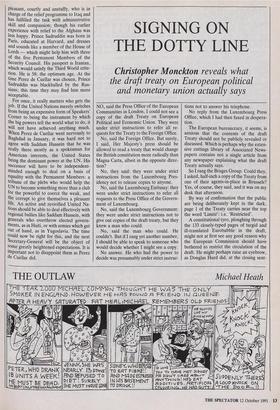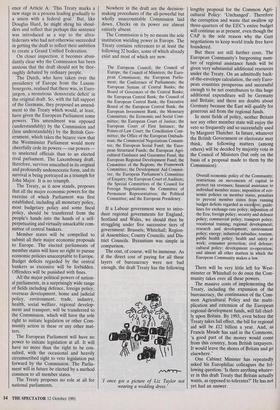SIGNING ON THE DOTTY LINE
Christopher Monckton reveals what
the draft treaty on European political and monetary union actually says
NO, said the Press Office of the European Communities in London, I could not see a copy of the draft Treaty on European Political and Economic Union. They were under strict instructions to refer all re- quests for the Treaty to the Foreign Office.
No, said the Foreign Office. But surely, I said, Her Majesty's press should be allowed to read a treaty that would change the British constitution more radically than Magna Carta, albeit in the opposite direc- tion?
No, they said: they were under strict instructions from the Luxembourg Pres- idency not to release copies to anyone.
No, said the Luxembourg Embassy: they were under strict instructions to refer all requests to the Press Office of the Govern- ment of Luxembourg.
No, said the Luxembourg Government: they were under strict instructions not to give out copies of the draft treaty, but they knew a man who could.
No, said the man who could. He couldn't. But if I rang yet another number, I should be able to speak to someone who would decide whether I might see a copy.
No answer. He who had the power to decide was presumably under strict instruc- tions not to answer his telephone.
No reply from the Luxembourg Press Office, which I had then faxed in despera- tion.
The European bureaucracy, it seems, is anxious that the contents of the draft Treaty should not be publicly revealed or discussed, Which is perhaps why the exten- sive cuttings library of Associated News- papers contains not a single article from any newspaper explaining what the draft Treaty actually says.
So I rang the Bruges Group. Could they, I asked, half-inch a copy of the Treaty from one of their agents-in-place in Brussels? Yes, of course, they said, and it was on my desk that afternoon.
By way of confirmation that the public are being deliberately kept in the dark, page 1 of the Treaty carries near the top the word `Limite': i.e. 'Restricted'.
A constitutional tyro, ploughing through the 133 closely-typed pages of turgid and ill-translated Eurobabble in the draft, might not at first see any good reason why the European Commission should have bothered to restrict the circulation of the draft. He might perhaps raise an eyebrow, as Douglas Hurd did, at the closing sent- ence of Article A: 'This Treaty marks a new stage in a process leading gradually to a union with a federal goal.' But, like Douglas Hurd, he might shrug his shoul- ders and reflect that perhaps this sentence was introduced as a sop to the ultra- federasts who had not otherwise succeeded in getting the draft to reflect their ambition to create a Grand Unified Federation.
On closer inspection, it becomes abun- dantly clear why the Commission has been anxious that the draft should not be thor- oughly debated by ordinary people.
The Dutch, who have taken over the presidency of Europe from the Luxem- bourgeois, realised that there was, in Euro- jargon, a monstrous 'democratic deficit' in the original draft. So, with the full support of the Germans, they proposed an amend- ment to the Treaty which would, at least, have given the European Parliament some powers. This amendment was opposed (understandably) by the Commission and (less understandably) by the British Gov- ernment, which takes the bizarre view that the Westminster Parliament would more cheerfully cede its powers — our powers to unelected officials than to an elected rival parliament. The Luxembourg draft, therefore, survives unscathed in its original and profoundly undemocratic form, and its survival is being portrayed as a triumph for John Major. It is no triumph.
The Treaty, as it now stands, proposes that all the major economic powers for the exercise of which Parliament was first established, including all monetary policy, most budgetary policy and some fiscal policy, should be transferred from the people's hands into the hands of a self- perpetuating and virtually unsackable com- mittee of central bankers.
Member states will be compelled to submit all their major economic proposals to Europe. The elected parliaments of member states will have no right to pursue economic policies unacceptable to Europe. Budget deficits regarded by the central bankers as excessive will be forbidden. Offenders will be punished with fines.
All the major political powers of nation- al parliaments, in a surprisingly wide range of fields including defence, foreign policy, overseas development, home and judicial policy, environment, trade, industry, health, social welfare, regional develop- ment and transport, will be transferred to the Commission, which will have the sole right to initiate legislation or other Com- munity action in these or any other mat- ters.
The European Parliament will have no power to initiate legislation at all. It will have no more than the right to be con- sulted, with the occasional and heavily circumscribed right to veto legislation put forward by the Commission. The Parlia- ment will in future be elected by a method common to all member states.
The Treaty proposes no role at all for national parliaments. Nowhere in the draft are the decision- making procedures of the all-powerful but wholly unaccountable Commission laid down. Checks on its power are almost entirely absent.
The Commission is by no means the sole institution wielding power in Europe. The Treaty contains references to at least the following 32 bodies, some of which already exist and most of which are new:
The European Council; the Council of Europe; the Council of Ministers; the Euro- pean Commission; the European Parlia- ment; the Conference of Parliaments; the European System of Central Banks; the Board of Governors of the Central Banks; the European Central Bank; the Council of the European Central Bank; the Executive Board of the European Central Bank; the European Investment Bank; the Monetary Committee; the Economic and Social Com- mittee; the European Court of Justice; the European Court of First Instance; the Points-of-Law Court; the Conciliation Com- mittee; the Office of the European Ombuds- man; the Commercial Negotiations Commit- tee; the European Social Fund; the Euro- pean Structural Funds; the European Agri- cultural Guidance and Guarantee Fund; the European Regional Development Fund; the Committee of the Regions; the Framework Committee; the Development Aid Commit- tee; the European Parliament's Committee of Enquiry; the European Court of Auditors; the Special Committees of the Council for Foreign Negotiations; the Committee of Permanent Representatives; the Political Committee; and the European Presidency.
If a Labour government were to intro- duce regional governments for England, Scotland and Wales, we should then be struggling under five successive tiers of government: Brussels; Whitehall; Region- al Assemblies; County Councils; and Dis- trict Councils. Byzantium was simple in comparison.
The cost, of course, will be immense. As if the direct cost of paying for all these layers of bureaucracy were not bad enough, the draft Treaty has the following 'I once got a picture of Liz Taylor not wearing a wedding dress.' lengthy proposal for the Common Agri- cultural Policy: 'Unchanged'. Therefore the corruption and waste that swallow up three-quarters of the EEC's entire budget will continue as at present, even though the CAP is the sole reason why the Gatt negotiations to keep world trade free have foundered.
But there are still further costs. The European Community's burgeoning num- ber of regional assistance funds will be given very substantial additional resources under the Treaty. On an admittedly back- of-the-envelope calculation, the only Euro- pean countries prosperous and successful enough to be net contributors to this huge additional expenditure will be Germany and Britain; and there are doubts about Germany because the East will qualify for generous aid from the regional funds.
In most fields of policy, neither Britain nor any other member state will enjoy the veto so frequently and so successfully used by Margaret Thatcher. In future, whatever the British Government or electorate may think, the following matters (among others) will be decided by majority vote in the Council of Ministers (but only on the basis of a proposal made to them by the Commission):
Overall economic policy of the Community; restrictions on movements of capital to protect tax revenues; financial assistance to individual member states; imposition of eco- nomic policies on member states; penalties i
os
to prevent member states fr m running budget deficits regarded as exc ive; guide- lines for exchange-rate policy; im ition of the Ecu; foreign policy; security and defence policy; commercial policy; transport policy; vocational training; regional development; research and development; environment policy; energy; industrial subsidies; tourism; public health policy; health and safety at work; consumer protection; civil defence; cultural policy; development co-operation; and almost all other matters in which the European Community makes a law.
There will be very little left for West- minster or Whitehall to do once the Com- munity takes over all these powers.
The massive costs of implementing the Treaty, including the expansion of the bureaucracy, the continuance of the Com- mon Agricultural Policy and the multi- plication and extension of the European regional development funds, will fall chief- ly upon Britain. By 1993, even before the Treaty takes full effect, the bill for regional aid will be £12 billion a year. And, as Francis Maude has said in the Commons, `a good part of the money would come from this country, from British taxpayers. It would leave the shores of Britain and go elsewhere.'
One Cabinet Minister has repeatedly asked his Europhiliac colleagues the fol- lowing question: 'Is there anything whatev- er in this draft Treaty that Britain actually wants, as opposed to tolerates?' He has not yet had an answer.



























































 Previous page
Previous page